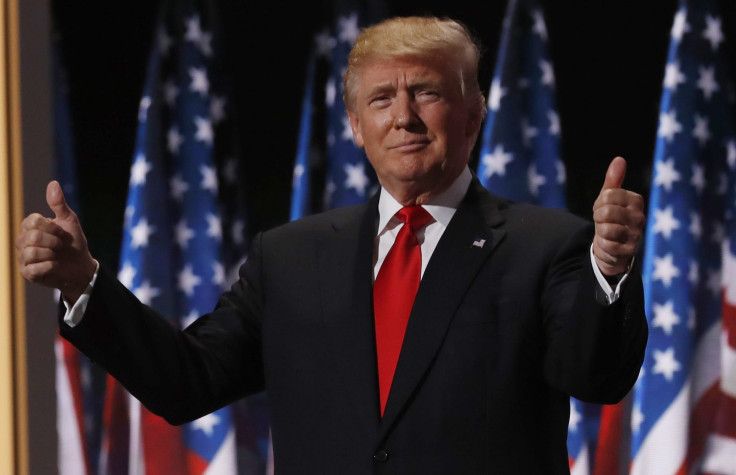Would Donald Trump Be A Dictator? RNC Speech Draws Mussolini Comparisons From Critics [VIDEO]

Donald Trump's critics have been comparing his political appeal and proposals to those of famous dictators for awhile now. For many, the GOP nominee's speech at the Republican National Convention Thursday just helped complete the picture.
Some of Trump's biggest critics and political rivals, including Massachusetts Sen. Elizabeth Warren, Vermont Sen. Bernie Sanders and HBO comedian Bill Maher, renewed the dictator comparisons in the aftermath of Trump's speech. They argued that his pitch to voters is rooted in fear and that his positioning of himself as the only true solution to the country's problems warranted the comparisons.
"He looked a lot like Mussolini tonight," said Bill Maher during a special convention episode of HBO's "Real Time with Bill Maher" Thursday. "Did you see that? He would say something and then [shake his finger]."
The optics of Trump's speech certainly did not doing anything to stave off those comparisons. Trump spoke on a stage adorned with a gold-plated podium before a striking line of American flags and below a massive screen projecting his face to the convention floor. Trump's posturing during pauses, including a restrained grin while stepping back and giving emphatic pointing gestures, also bore surface visual similarities to the body language of former Italian dictator Benito Mussolini, critics said.
Other convention moments, such as conservative radio talk show host Laura Ingraham's alleged Nazi salute, further stroked complaints about the possibility of an authoritarian political movement.
I feel like Laura Ingram plagiarized this salute from someone... #RNCinCLE pic.twitter.com/QbE4Y6fz2J
— Travon Free (@Travon) July 21, 2016
In his speech, Trump spoke of a country beset by numerous threats, both domestic and abroad. He implied that, with his business savvy and outsider status, he alone was capable of solving the country's problems.
"Our convention occurs at a moment of crisis for our nation. The attacks on our police, and the terrorism in our cities, threaten our very way of life. Any politician who does not grasp this danger is not fit to lead our country," Trump said. "I am the law and order candidate."
Sanders, whose campaign supporters Trump has courted, said Trump's rhetoric was evocative of fascist regimes.
Trump: “I alone can fix this.”
— Bernie Sanders (@BernieSanders) July 22, 2016
Is this guy running for president or dictator? #RNCwithBernie
Warren was even harsher in her criticism, accusing Trump of fear-mongering in his warnings about the threats posed by terrorists, immigrants and protesters.
"He sounded like a two-bit dictator of some country that you couldn’t find on a map," Warren told comedian Stephen Colbert on "The Late Show" after the speech. "He sounded like the dictator of a small country rather than a man who is running for the highest office of the strongest democracy on the face of this Earth."
Trump has called for a temporary ban on Muslims entering the country, the deportation of millions of illegal immigrants, the construction of a wall on the U.S.-Mexico border and a crackdown on protesters from groups like Black Lives Matter, who he says are stoking anti-police sentiments. He claims those policies are necessary to address the threats posed by terrorists, illegal immigrants and criminals, but many critics argue they reflect a racist, nationalist ideology.
"I have a message for all of you: the crime and violence that today afflicts our nation will soon — and I mean very soon — come to an end. Beginning on Jan. 20th, 2017, safety will be restored," he said Thursday.
David Duke, a former grand wizard for the KKK, praised Trump's speech on Twitter.
Trump has also inspired thousands of protesters against his campaign, which led to a disturbing string of violence during the primaries as his supporters physically fought back.
Experts have pored over Trump's campaign and policy proposals for months to determine whether they warrant the "dictator" label or the "fascist" label or the "populist" label. In March, a Huffington Post/YouGov poll found that nearly half of the country believes the Trump campaign has had fascist undertones.
© Copyright IBTimes 2024. All rights reserved.












